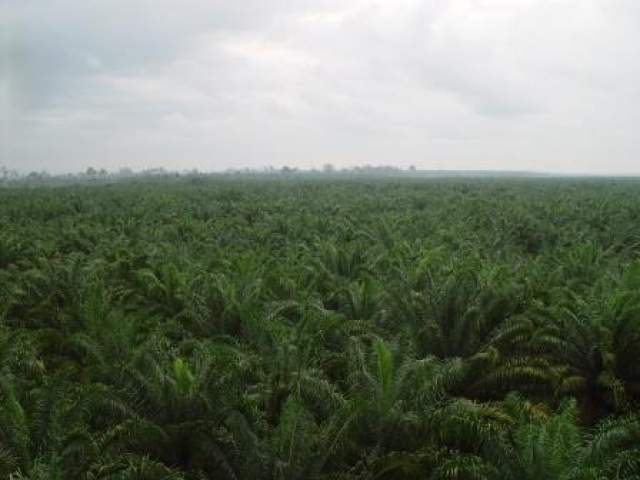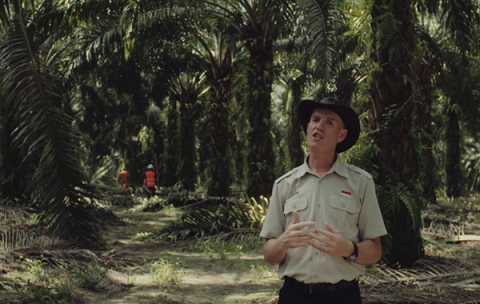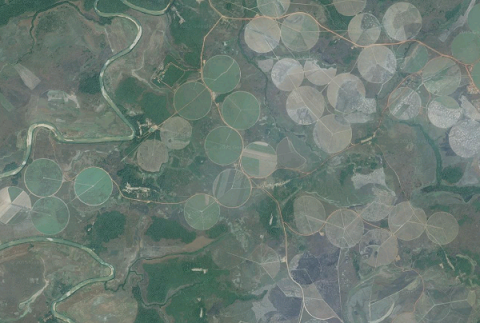Land Grabbing: “Big, big problem”

Expansive Sawit (Photo: LifeMosaic)
“It’s very attractive. The earnings are very high and we’ve got hybrid material now. You harvest in the 24th month, and the repayment period is about seven years at the most… For the next 20 years it’ll be laughing yourself all the way to the bank.”
That’s Suriya Moorthy, a consultant for agricultural investments in Malaysia, talking about oil palm investments. The quotation is from a documentary film, “Land Grabbing“.
It’s well worth a watch – if you’re in London, it’s showing at Bertha DocHouse from 29 January to 4 February 2016 (details here).
Director Kurt Langbein visits the scenes of land grabs and talks to farmers, local communities and to the investors behind the schemes.
Here’s a trailer for the film:
The documentary team travelled to Cambodia, to investigate a sugar plantation that has taken people’s land. They talk to Venerable Luon Sovath, a buddhist monk who interviews villagers and documents everything he finds. More than 1,000 families living in the area were violently evicted. Many houses were burned.
The plantation belongs to Phnom Penh Sugar, a company run by Senator Ly Yong Phat. The sugar is exported to the European Union. Under the EU’s “Everything but Arms” treaty with Cambodia, the sugar is exported duty free.
The documentary looks at large-scale industrial agriculture in Romania and contrasts this with small-scale farming there. While small-scale farmers can get small subsidies from the EU, millions of Euros are available for industrial agriculture.
In Ethiopia, we see how tomatoes and peppers are grown in greenhouses for the “top of the market” in the Middle East and Africa. The work is backbreaking and poorly paid. Workers are searched when they leave work to check that they haven’t stolen any tomatoes. It’s enough to make you want to boycott tomatoes.
For me, the most extraordinary part of the film is in Indonesia. We see workers on an oil palm plantation belonging to Cargill. They stand in rows and recite the “Hindoli Plantation Employees Pledge”. This includes a list of seven items, starting as follows:
I’m ashamed of myself:
1. When I don’t follow the rules and I make a mistake.
2. When I don’t use my personal safety equipment.
John Hartman, a manager at Cargill, explains how important discipline and routine is within the workforce. Hartman explains the importance of sustainability. Behind him is the industrial oil palm monoculture where rainforest once stood.

A bioenergy plant in Sierra Leone is the next stop. Addax Bioenergy earned Africa’s first Rountable on Sustainable Bioenergy certification. But Ibrahim Serie, a village head, describes how villagers gave away their land without understanding the impacts on their livelihoods.
Addax showed the villagers a map and told them how many hectares of land they had. “We didn’t even know what a hectare was,” Serie says.
The biofuel from Addax’s bioenergy plant in Sierra Leone will be exported to Europe, where it will be blended with petrol to be used by cars. ADDAX got a €250 million loan from public funds, including from the Development Bank of Austria.

While there was no violence or evictions to make way for Addax’s sugar plantations, farmers have entered into contracts that result in them losing their land over longer periods of time. While some have benefitted, others are losing out. Water supply has been affected through Addax’s irrigation schemes.
“If Addax won’t help us drill a well, they’re going to kill us,” Serie says. He accuses Addax of mixing chemicals into the water sprayed onto the sugar cane. “Our animals died from eating weeds near the sugar cane fields,” he says. In the rainy season, the chemicals are washing into the river. “This is a major problem for us. Big, big problem.”
The documentary makes no comment, but none is necessary. The injustice of this destructive “development” model could not be clearer.
Article: Chris Lang
Source: redd-monitor.org
Related Project:

Territories of Life
The Territories of Life toolkit is a series of 10 short videos that share stories of resistance, resilience and hope with communities on the front-line of the global rush for land. These videos, available in English, Spanish, French, Indonesian and Swalhili and are currently being disseminated widely by community facilitators.
Categories
Latest news
- LifeMosaic’s latest film now available in 8 languages
- การเผชิญหน้ากับการสูญพันธุ์ และการปกป้องวิถีชีวิต (Thai)
- LANÇAMENTO DO FILME BRASIL : Enfrentando a Extinção, Defendendo a Vida
- Enfrentando la Extinción, Defendiendo la Vida (Español)
- Peluncuran video baru dalam Bahasa Indonesia : Menghadapi Kepunahan, Mempertahankan Kehidupan


